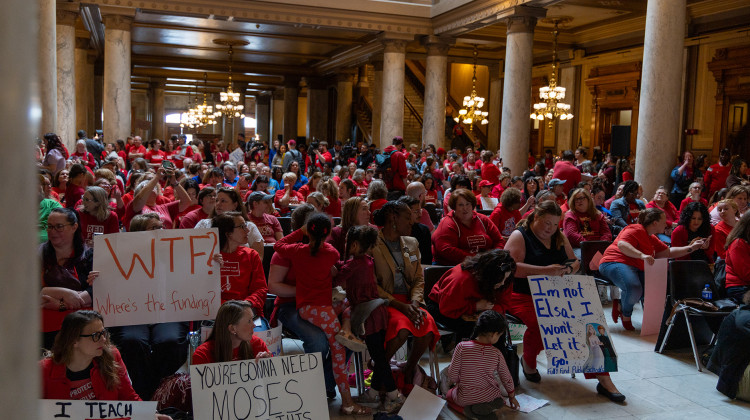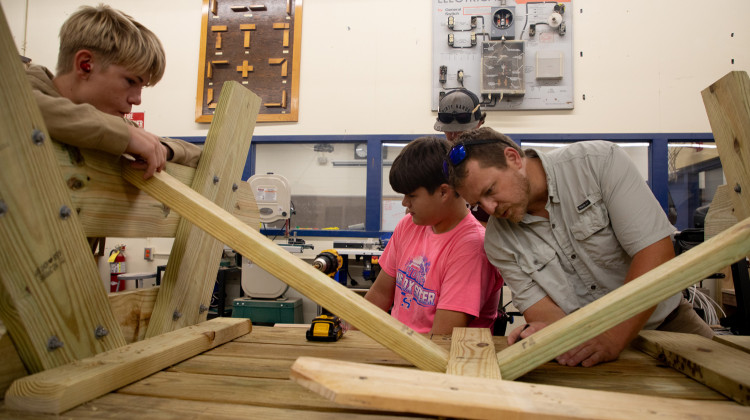
Casey McLeod (left), school leader for KIPP Indy College Prep Middle, said she’s received positive feedback from students involved in the tutoring program, which began in late spring. Gerlin Cartagena (right) is one student participating in the tutoring program.
(Lee V. Gaines/WFYI)When schools closed last spring due to the COVID-19 pandemic and learning went online, Carmen Cartagena immediately noticed her daughter struggling to focus on virtual school. Cartagena’s daughter, Gerlin, is 12 years old and entering the seventh grade at KIPP Indy Schools, a charter school network in the Martindale-Brightwood neighborhood of Indianapolis.
Cartagena said she had to take time off from her job to be with her children during the pandemic, and that it was especially important that she was available for Gerlin.
“When she was working virtually, she would be asked a question and sometimes she would even be asleep at the computer. And I had to be paying attention to make sure that her things were getting done,” Cartagena said, speaking through an interpreter. (Cartagena is from Puerto Rico and her native language is Spanish.)
Gerlin’s school work suffered. Cartagena said Gerlin is shy, and she struggled to answer questions during virtual lessons.
“She's very smart and very able. And I think there's just currently a lot of distractions in her head,” Cartagena said. “And I want help from the school to be able to get her back to where she should be and where she used to be.”
‘Maximum Success’
Gerlin isn’t the only student to struggle as a result of pandemic-induced school closures. Less than 2 percent of students at her middle school — just six out of 354 who were tested — earned scores of proficient on both the math and English language arts portions of the state's ILEARN exam. Statewide, fewer than 30 percent of Indiana students scored proficient in both math and English.
As students begin to transition back to school following two academic years riddled with classroom disruptions, districts are flush with federal cash. To help the tens of thousands of students who have fallen behind academically, some districts, including KIPP Indy Schools, have turned to tutoring services. But it’s unclear if schools will be able to sustain their investment in one-on-one instruction after the COVID-19 relief money runs out.
READ MORE: ILEARN Scores Point To Years Of Recovery For Marion County Students
KIPP Indy Schools serves mostly low-income students of color, and the charter school network is due to receive nearly $13 million from two rounds of COVID-19 relief legislation passed last December and this spring. For comparison, the charter network’s operating budget for its elementary, middle and high schools totals about $20 million for the upcoming school year, according to executive director of KIPP Indy Schools, Andy Seibert.
Seibert said KIPP Indy officials spoke with parents and other stakeholders to determine how to spend the school corporation’s federal dollars.
“And what we heard directly from these different stakeholders was that students, particularly coming out of COVID, are thriving most when they're able to be met exactly where they're at,” Seibert said. “And so oftentimes, that means learning in small groups or learning one-on-one, and for many students, that intimate individualized setting sets them up for maximum success.”
A spokesperson for KIPP Indy said the charter network is paying Varsity Tutors, a St. Louis-based for-profit company, $56,000 for online tutoring services for several dozen students, including Gerlin.
Casey McLeod, school leader for KIPP Indy College Prep Middle, said she’s received positive feedback from students involved in the tutoring program, which began in late spring. Students who are reserved, like Gerlin, are more comfortable in a one-on-one environment, even if it’s still virtual.
“In that more intimate one-on-one setting, it's easier to be on camera, to be off mute, to be able to orally recite what content they're working on,” McLeod said. “There's less anxiety associated with that in a smaller group.”
DATABASE: HOW MUCH EACH INDIANA PUBLIC SCHOOL DISTRICT IS RECEIVING IN FEDERAL COVID FUNDING
She said the 35 students selected to participate receive 60-minute lessons three times per week. They’re mostly students whose families elected to have them stay home and continue learning remotely over the past school year. Depending on the student, the tutoring services run the gamut from spoken and written English language to Advanced Placement materials.
McLeod said different assessments are used to determine progress in a given subject area. In addition to focusing on the academic needs of students, McLeod also hopes that tutoring lessens anxiety around learning for children who have grown increasingly anxious during virtual lessons.
“So, the moment I make a mistake, I have a tutor there who's identifying it, they're helping me overcome it. And we can build strong relationships with tutors that way. So our students are developing trust in the ability to normalize error and take academic risks.”
Equitable Tutoring?
Matthew Kraft, an associate professor of education and economics at Brown University, said the research is “overwhelming” that high dosage tutoring is one of the most effective ways to help students improve academically.
“We're at this juncture now where we have tutoring as a model that can make a big difference in the lives of kids,” he said. “But we really don't know what it means to take something like a small, highly effective tutoring program and make that accessible to hundreds of thousands or millions of students.”
Kraft said there is less evidence to demonstrate the efficacy of virtual tutoring, but it can provide access to tutoring services that otherwise might not be available. He said it’s understandable that schools would turn to virtual services in a time when the need for tutoring is immense.
But Kraft said what’s potentially lost in a virtual space is familiarity with a student’s local context and background, and a personal connection that he said can motivate students to succeed.
He recommends schools invest in tutoring for the long-term by developing partnerships with local tutoring services to complement what students receive online.
Kraft said tutors can provide more than academic interventions; they can also serve as mentors for students.
“I think that local partnerships are important because knowing about the context in which a student is learning, what the school is like, what their background and neighborhood is like, is important for forming those relationships,” he said.
Kraft said spending federal cash on tutoring services makes sense when so many students are struggling. But he fears that one-on-one instructional services for low-income students will disappear once the federal money dries up in a few years.
“Because the status quo is that families who can afford that can access it in the private market, and those that can't, are unable to benefit from it. And that's deeply inequitable.”
Expanding Access
KIPP Indy plans to expand the number of students receiving virtual tutoring services throughout the school year — from 35 to up to 85, according to a spokesperson for the charter network. KIPP also plans to pay a company called College Tutors $120,000 to provide 10 in-person tutors who will come to the network’s schools to provide one-on-one math support to students three days per week during the upcoming school year.
McLeod, the school leader for KIPP Indy’s middle school, said tutoring is not an inexpensive intervention. She said the network is using federal funding to support tutoring services, and “while we're on this journey, we're collectively exploring other opportunities. How can we continue to have this be a pillar of the services that we offer, even when that money is no longer available to us?”
Carmen Cartagena, Gerlin’s mom, said she hopes the network continues to invest in individualized instruction. She said she’s noticed a difference in Gerlin’s ability to focus since she began working with her online tutor.
“I actually honestly noticed a change with her from day one of tutoring,” Cartagena said. “She's pretty reserved, but she has opened up and told me that she likes it. ... And I really think she's understanding what she's being taught. I noticed now that when she's asked questions by the tutor, she answers them.”
Classes at KIPP Indy's three schools start Aug. 2 for the 2021-22 school year.
Contact reporter Lee V. Gaines at lgaines@wfyi.org. Follow on Twitter: @LeeVGaines.
 DONATE
DONATE





 View More Articles
View More Articles



 Support WFYI. We can't do it without you.
Support WFYI. We can't do it without you.